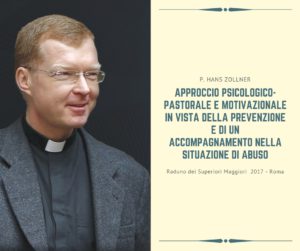 After the prayers and the celebration of the Eucharist in the early morning, those taking part in the meeting of the major Superiors of the Order proceeded to welcome Fr. Hans Zollner, a Jesuit religious, the director of the Faculty of Psychology of the Gregorian University of Rome and the founder and director of the Centre for Child Protection (CCP). This was the moment to complete what had already been addressed on Sunday 25 June regarding the ‘thorny, painful and impelling’ question of the defence and protection of minors and vulnerable people against sexual abuse. Fr. Zollner engaged in this exchange of views with a psychological-pastoral and motivational approach to prevention and the accompanying of the victims of abuse.
After the prayers and the celebration of the Eucharist in the early morning, those taking part in the meeting of the major Superiors of the Order proceeded to welcome Fr. Hans Zollner, a Jesuit religious, the director of the Faculty of Psychology of the Gregorian University of Rome and the founder and director of the Centre for Child Protection (CCP). This was the moment to complete what had already been addressed on Sunday 25 June regarding the ‘thorny, painful and impelling’ question of the defence and protection of minors and vulnerable people against sexual abuse. Fr. Zollner engaged in this exchange of views with a psychological-pastoral and motivational approach to prevention and the accompanying of the victims of abuse.
Fr. Zollner emphasised the absolute need to receive and listen to victims in a profoundly empathetic way. He described some details of the meetings of Pope Francis with many victims of sexual abuse: deep and participatory listening with intense involvement; listening extended in time to the point that after some time has passed the Pope asks, and informs himself, about their situation and their lives.
The aim is to continue to be sensitised, to grow at the level of information and formation in order to have an increasing knowledge of the gradualness of the processes involved and to organise in an effective way the steps that have to be taken.
The commonplaces of this subject were addressed. They are often used so as not to speak, not to look for the truth of the facts: this is a problem of the West, it does not exist here; the abuse of minors is prohibited in our culture; with others it is worse (in other religions, in the world of sport…); there are so many false accusations; the mass media want to destroy the Church; a rhetorical reduction of the causes of the phenomenon to homosexuality alone or to the celibacy of priests…
Fr. Zollner addressed the ‘conceptual confusion’ that makes its way into general understanding when this phenomenon is addressed: sexual abuse v. physical abuse v. emotional abuse v. spiritual abuse; paedophilia-ephebophilia; paedo/pornography and the use of the media; moral responsibility; the priority commitment of prevention-protection (safeguarding); relationships with the media and care in the ‘correct’ use of words and terms when this phenomenon is approached…
Another important aspect connected with this subject is the quality of the formation of candidates for priestly life and religious life and their ongoing formation. Reference should be made in particular to number 2020 of the new Ratio fundamentalis institutionis sacerdotalis which was recently promulgated (8 December 2016) by the Congregation for the Clergy. This is a document that we are strongly invited to read, to examine in depth, and to place in our programmes of formation as well.
Why this priority commitment to formation and prevention? Because the Lord himself ask this of us: “Let the children come to me, do not hinder them” (Mk 10:14); “Whoever causes one of these little ones who believe in me to sin, it would be better for him of a great milestone were hung around his neck and he were thrown into the sea” (Mk 9:42); “the truth will make you free” (Jn 8:32).
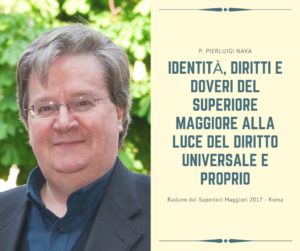 In the afternoon Fr. Pierluigi Nava, a Montfortian religious and an expert in canon law applied to consecrated life, led us into the subject of ‘Governance: the Identity, Rights and Duties of Major Superiors in the Light of Universal Law and the Law of a Religious Institute’. He highlighted the dynamic that should be lived in the relationship between a major Superior and his council (a stable and organic group to help in the exercise of the office of the Superior and thus the exercise of his governance, with an overall vision of the great organisational, managerial, historical, formative etc. heritage of the Order. One is dealing here with cooperating-working together in order to appreciate the experiences and the skills of all the members of the council itself). This must be a dynamic of ‘shared discernment’ in line with the spirit of unum sentire in Christ, supported by a rigorous deontological approach: providing the information that is needed; protecting the free expression of thought; and the diligent observation of the secrecy of shared analysis, with a view to the formulation of a judgement on a practical situation that should then be implemented. The exercise of power is an exercise of synthesis within a Church-ecclesial context of activity that reveals and manifests its most authentic contents – the gospel. This is the nexus of authenticity; knowing how to take decisions that are within the narrow logic of ‘one’s own garden’, in order to see the broadest horizon of the field of God; it is a search for new dynamics, for new means by which to advance in a new ministerial and missionary experience. This is a matter of being effective and efficient as regards our specific mission as an Order. In this horizon, governance means knowing how to manage complexity (the relationship between the centre and the outlying parts of the Order); emergencies (sudden changes); and the exceptional character (in relation to our very ‘stable’ recent past as well) of situations and experiences. And this in a dynamic towards a shared vision, towards shared decisions (knowing how to understand the partial horizon of the other), with a vision of the future (through the hard work and patience of producing consensus within the council itself), otherwise there will be the spread of the methodology of the fragmentation of tasks, and in the end, amongst the religious themselves, at a basic level there will be malaise, a sense of disorientation…and in the end a feeling of non-membership is increased. The major Superior and his council must produce a sense of direction but also a meaningful direction in order to retrieve a sense of trust and know how to justify to the religious the decisions that have been taken at the ‘top’.
In the afternoon Fr. Pierluigi Nava, a Montfortian religious and an expert in canon law applied to consecrated life, led us into the subject of ‘Governance: the Identity, Rights and Duties of Major Superiors in the Light of Universal Law and the Law of a Religious Institute’. He highlighted the dynamic that should be lived in the relationship between a major Superior and his council (a stable and organic group to help in the exercise of the office of the Superior and thus the exercise of his governance, with an overall vision of the great organisational, managerial, historical, formative etc. heritage of the Order. One is dealing here with cooperating-working together in order to appreciate the experiences and the skills of all the members of the council itself). This must be a dynamic of ‘shared discernment’ in line with the spirit of unum sentire in Christ, supported by a rigorous deontological approach: providing the information that is needed; protecting the free expression of thought; and the diligent observation of the secrecy of shared analysis, with a view to the formulation of a judgement on a practical situation that should then be implemented. The exercise of power is an exercise of synthesis within a Church-ecclesial context of activity that reveals and manifests its most authentic contents – the gospel. This is the nexus of authenticity; knowing how to take decisions that are within the narrow logic of ‘one’s own garden’, in order to see the broadest horizon of the field of God; it is a search for new dynamics, for new means by which to advance in a new ministerial and missionary experience. This is a matter of being effective and efficient as regards our specific mission as an Order. In this horizon, governance means knowing how to manage complexity (the relationship between the centre and the outlying parts of the Order); emergencies (sudden changes); and the exceptional character (in relation to our very ‘stable’ recent past as well) of situations and experiences. And this in a dynamic towards a shared vision, towards shared decisions (knowing how to understand the partial horizon of the other), with a vision of the future (through the hard work and patience of producing consensus within the council itself), otherwise there will be the spread of the methodology of the fragmentation of tasks, and in the end, amongst the religious themselves, at a basic level there will be malaise, a sense of disorientation…and in the end a feeling of non-membership is increased. The major Superior and his council must produce a sense of direction but also a meaningful direction in order to retrieve a sense of trust and know how to justify to the religious the decisions that have been taken at the ‘top’.
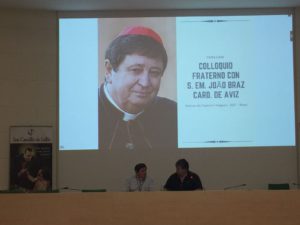 Without rules, there can be no trust. Only with shared rules can there be mutual trust so as to be able to express thoughts with respect and loyalty. Rules allow our consistency in decisions to be exercised. The manifestation of personal opinions is the domain for the exercise of responsibilities. The first responsibility of the Superior and his council is deep care for the members of the Order who are entrusted to them, in line with a logic of transparency and the shouldering of personal and group responsibility, so as to ‘revive the gift of God in us’ and our confreres.
Without rules, there can be no trust. Only with shared rules can there be mutual trust so as to be able to express thoughts with respect and loyalty. Rules allow our consistency in decisions to be exercised. The manifestation of personal opinions is the domain for the exercise of responsibilities. The first responsibility of the Superior and his council is deep care for the members of the Order who are entrusted to them, in line with a logic of transparency and the shouldering of personal and group responsibility, so as to ‘revive the gift of God in us’ and our confreres.
In the late afternoon we had a fraternal conversation with His Eminence Cardinal João Braz de Aviz, the Prefect of the Congregation for Institutes of Consecrated Life and Societies of Apostolic Life. We shared in a look at the life of the Church and a vision of consecrated life, given contemporary developments, and of our Order of Camillians in particular.



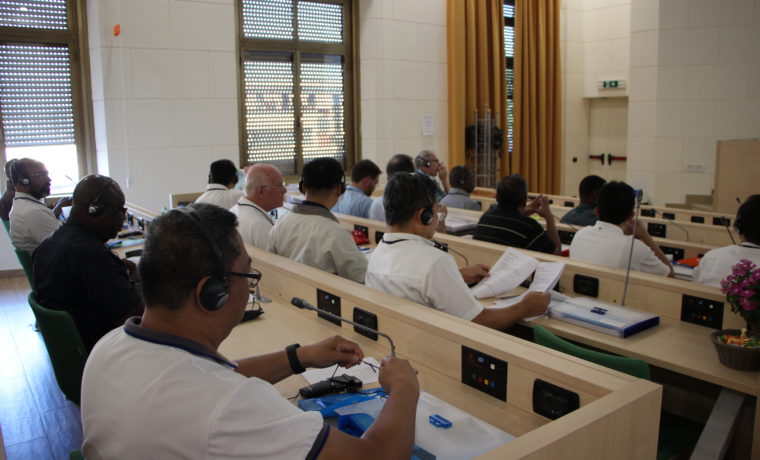
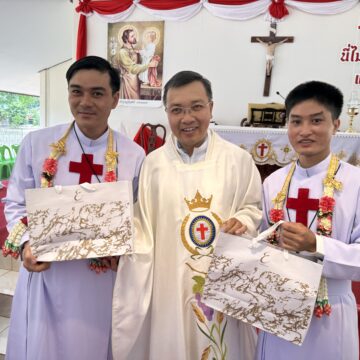
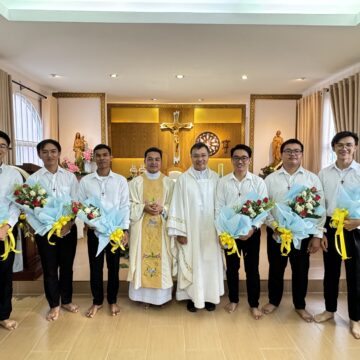
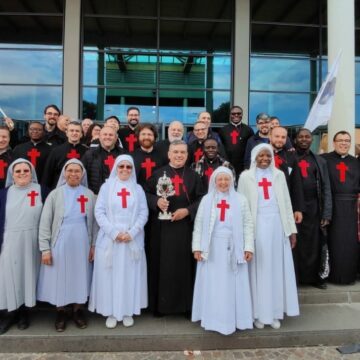
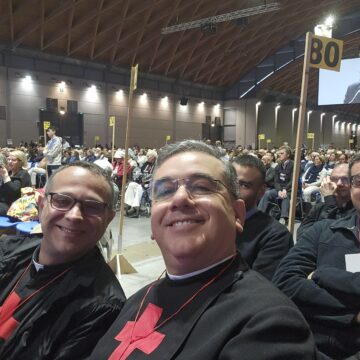
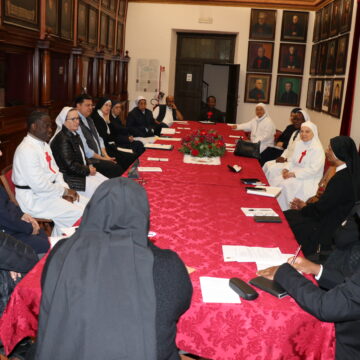
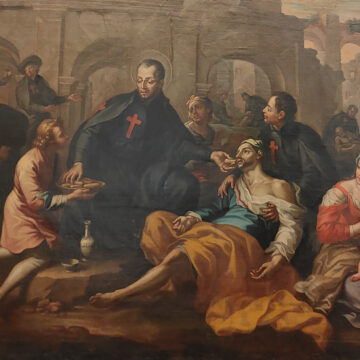






Camillians on Facebook
Camillians on Twitter
Camillians on Instagram